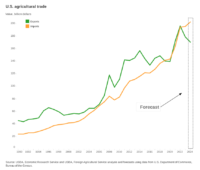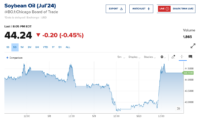Bloomberg's Clarice Couto reported this past Friday that "a surprising tax change in agriculture powerhouse Brazil has the potential to make soy grown in the world’s largest bean exporter less…
U.S., China Take Initial Step on Trade Deal; China Agrees to Buy $40-$50 Billion in U.S. Farm Goods Amid Rough Details
William Mauldin, Chao Deng and Vivian Salama reported in Saturday’s Wall Street Journal that, “The U.S. and China took an initial step to cement a trade agreement that had been derailed, with Washington saying on Friday it would shelve a planned increase in tariffs on goods imported from China, while Beijing would increase purchases of U.S. agricultural products.
“The two sides left many details to be worked out in the weeks or months ahead on tough issues including China’s enforcement of intellectual property rules, U.S. access to Chinese markets, Chinese government support for state-owned enterprises, and the fate of U.S. tariffs on nearly $360 billion worth of Chinese imports already in place.”
Tariffs that were set to rise on Tuesday have been called off pic.twitter.com/xHVO6e2SmI
— Jeff Mason (@jeffmason1) October 11, 2019
The Journal writes explained that, “The rough framework hashed out in two days of talks between senior U.S. and Chinese officials in Washington included a Chinese agreement to purchase American farm products totaling $40 billion to $50 billion, President Trump said, without specifying over what time period that would occur.”
Saturday’s article stated that, “Chinese state media said the two sides made ‘substantive progress’ on a range of issues including agriculture, but didn’t mention potential Chinese purchases.”
The Journal article added that,
The details of the agriculture deal are rough. If China increases purchases of U.S. agricultural goods by $40 billion to $50 billion in a year, that would mark substantial gains. In 2017, before the trade war started, China purchased about $24 billion a year of U.S. food and agricultural exports. If the promised sum is spread out over some longer period of time, it is less significant.
Ana Swanson reported in Saturday’s New York Times that, “If completed, the agreement would provide relief to American farmers and businesses that have been battered by the trade war. Mr. Trump said the ‘substantial’ agreement would involve China buying $40 billion to $50 billion worth of American agricultural products annually, along with guidelines on how it manages its currency, the renminbi.”
For context, since 2001 the most #agricultural #farm and related products sold to #China topped $29 BILLION in 2013 ($13B in 2018) #NationalFarmersDay @FarmBureau pic.twitter.com/bRce7PKbjk
— John Newton (@New10_AgEcon) October 12, 2019
Writing on the front page of Saturday’s Washington Post, David J. Lynch reported that, “The first steps include an increase in Chinese agricultural purchases, good news for American farmers who have lost billions of dollars in sales during the trade war. China recently began stepping up orders of U.S. farm products as a deal neared. But exports of U.S. soybeans to China fell from $12.2 billion in 2018 to just $3.1 billion last year, according to the U.S. Census Bureau.”
The deal I just made with China is, by far, the greatest and biggest deal ever made for our Great Patriot Farmers in the history of our Country. In fact, there is a question as to whether or not this much product can be produced? Our farmers will figure it out. Thank you China!
— Donald J. Trump (@realDonaldTrump) October 12, 2019
Start thinking about getting bigger tractors! https://t.co/MhmvNhAA4r
— Donald J. Trump (@realDonaldTrump) October 12, 2019
My deal with China is that they will IMMEDIATELY start buying very large quantities of our Agricultural Product, not wait until the deal is signed over the next 3 or 4 weeks. THEY HAVE ALREADY STARTED! Likewise financial services and other deal aspects, start preparing....
— Donald J. Trump (@realDonaldTrump) October 13, 2019
CHINA HAS ALREADY BEGUN AGRICULTURAL PURCHASES FROM OUR GREAT PATRIOT FARMERS & RANCHERS!
— Donald J. Trump (@realDonaldTrump) October 13, 2019
The Post article added that,
‘This agreement seemingly does nothing to address the crippling tariffs farmers currently face. The promise of additional ag purchases is welcome news but details on timeline, price, commodities and many other questions will have to be answered,’ said Brian Kuehl, of Farmers For Free Trade.
Don Lee reported in Saturday’s Los Angeles Times that, “Trump said China had agreed to boost U.S. agricultural purchases to $40 billion to $50 billion, from an annual high of $16 billion. He said half-jokingly that American farmers are going to have to ‘immediately buy more land and get bigger tractors.’
“But it wasn’t clear over what time period the Chinese would make those imports or even whether China had the capacity to boost purchases by that much. There was nothing in writing issued Friday, and [China’s top trade envoy, Vice Premier Liu He], who spoke briefly after meeting with Trump, provided no specifics about farm purchases or any part of the agreement, saying only that ‘we have made substantial progress in many fields.'”
Today’s phase one trade agreement w/ China includes $40 to $50 billion in purchases of U.S. #agriculture goods - this is welcome news for our farmers & ranchers and we appreciate the President’s efforts to advance this first phase.
— Senator John Hoeven (@SenJohnHoeven) October 11, 2019
I look forward to learning more details about this phase of the deal. I'll continue fighting on behalf of Iowans to ensure we're getting a good, fair deal for folks in our state and across the country.
— Joni Ernst (@SenJoniErnst) October 11, 2019
And Tyler Jett, David Jackson and Paul Davidson reported on the front page of Saturday’s Des Moines Register that, “Iowa politicians, farmers and business leaders were cautiously optimistic about a Chinese trade agreement that President Donald Trump announced ‘in principle’ Friday.
“But some said they wanted more specifics from the White House, citing other times over the past year when expected relief from trade tensions failed to materialize.
‘All of these things are positive,’ said Grant Kimberley, director of market development for the Iowa Soybean Association. ‘But there’s a whole lot of details that have to get worked out. Certainly, this is not a final deal. We have seen this before.’
“Kimberley said Iowa soybean farmers need Chinese buyers during their coming harvest. A delay until the winter or spring — when China buys its soybeans from South America — could be too late for some farmers.”
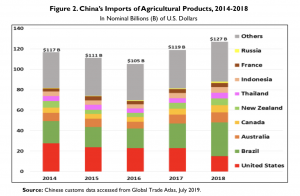
Bloomberg’s Shawn Donnan pointed out on Friday that, “The surge in Chinese purchases of U.S. farm products that is the biggest win for Trump in the agreement unveiled Friday is one that was first offered by Beijing more than two years ago.”
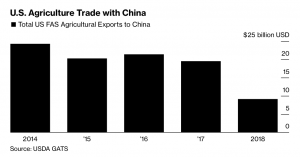
Bloomberg writers Isis Almeida and Josh Wingrove reported on Friday that, “The spending levels suggests ‘that they may plan on buying a lot of U.S. pork, along with the soybeans they need, as well as corn and ethanol,’ said Arlan Suderman, chief commodities economist at INTL FCStone Inc.”
Market watchers also pointed to the need to know about tonnage-commitments. Earlier this week, Chinese officials had discussed offering to buy total U.S. soybean volumes that could exceed 30 million tons, according to people familiar with the situation. Before the trade war, the Asian country bought 30 million to 35 million tons of soybeans in a normal year.
Also Friday, Michael Hirtzer and Isis Almeida reported at Bloomberg that, “Soybean futures jumped to the highest in more than three months, while corn extended gains, on news that the U.S. and China reached a partial agreement in the trade war that could lay the groundwork for a broader deal.”
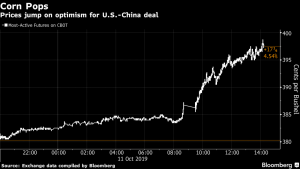
And Reuters writers Tom Polansek and Karl Plume reported on Friday that, “U.S. soybean prices climbed to the highest point since the start of the trade war ahead of the announcement on Friday. Trump said it will take up to five weeks to get a written agreement.”
Polansek and Plume pointed out that, “China imported more than 13 million tonnes of U.S. soy in the 2018/19 marketing year that ended Aug. 31 and has bought nearly 5 million tonnes more in the current season, according to government data. The sales were far short of the 30 million tonnes or more that China imported annually from the United States before the trade war.”
Bloomberg News reported on Monday that, “China wants to hold more talks this month to hammer out the details of the ‘phase one’ trade deal touted by Donald Trump before Xi Jinping agrees to sign it, according to people familiar with the matter.
Phase One is "quite substantial" says Treasury Secretary @stevenmnuchin1 on partial trade deal struck last week pic.twitter.com/Yct8vvdccg
— Squawk Box (@SquawkCNBC) October 14, 2019
“Beijing may send a delegation led by Vice Premier Liu He, China’s top negotiator, to finalize a written deal that could be signed by the presidents at the Asia-Pacific Economic Cooperation summit next month in Chile, one of the people said. Another person said China also wants Trump to scrap a planned tariff hike in December in addition to the hike scheduled for this week, something the administration hasn’t yet endorsed. The people asked not to be named discussing the private negotiations.”
Also on Monday, Reuters News reported that, “U.S. Treasury Secretary Steven Mnuchin said on Monday that an additional round of tariffs on Chinese imports will likely be imposed if a trade deal with China has not been reached by then, but added that he expected the agreement to go through.
“‘I have every expectation – if there’s not a deal, those tariffs would go in place – but I expect we’ll have a deal,’ he said in an interview with CNBC, when asked about a round of tariffs scheduled for Dec. 15.”






